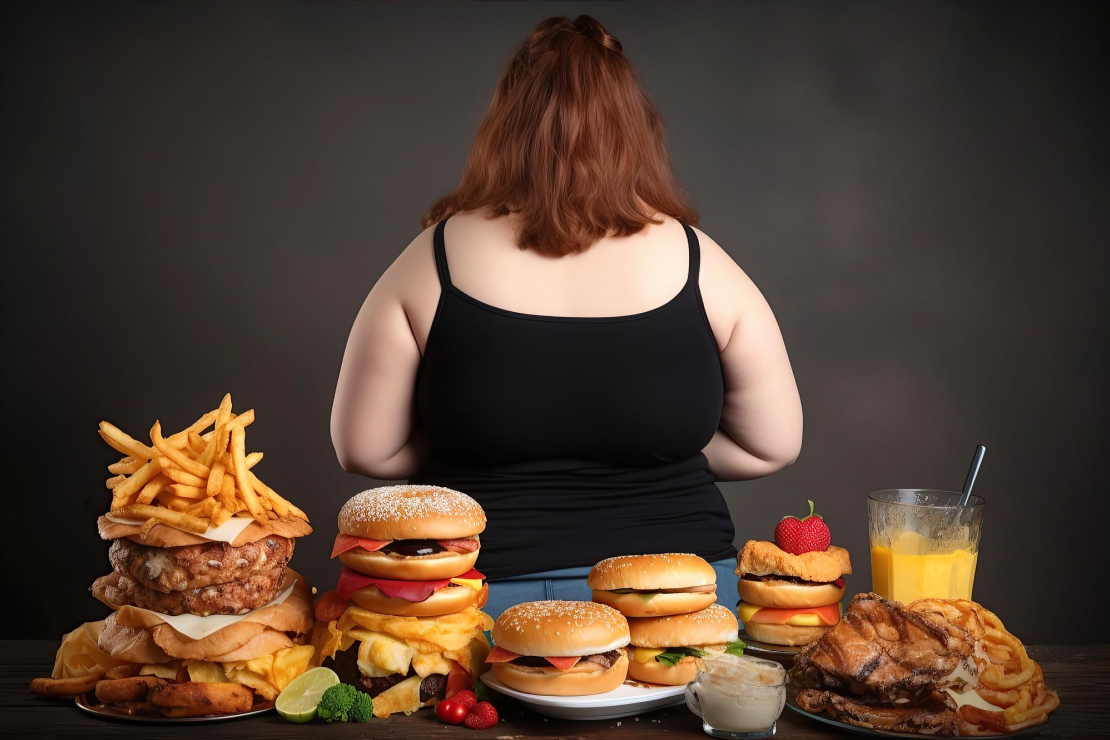The Psychology Behind Overeating and How to Stop It
Discover the science behind why we overeat, from brain chemistry to emotional triggers, and learn practical strategies to break the cycle. Get expert insights on mindful eating, stress management, and healthy habits.

Table of Content
Introduction
In our modern world of abundant food choices and constant stress, overeating has become an increasingly common challenge. This complex behavior isn't just about hunger or food availability—it's deeply rooted in our brain's chemistry, emotional responses, and evolutionary programming. Understanding the psychology behind overeating is the first step toward developing a healthier relationship with food.
The Science Behind Overeating
At its core, overeating is intricately linked to our brain's reward system—a complex network of neural circuits that evolved to ensure our survival. This sophisticated system developed during times when food was scarce, encouraging our ancestors to eat whenever food was available. In today's world of abundant food, this same system can work against us, creating powerful urges to eat even when we don't need to. The interaction between our brain's reward center, hormones, and environmental cues creates a complex web of influences that can make it challenging to maintain healthy eating patterns.
| Component | Role in Overeating |
|---|---|
| Dopamine | Primary reward neurotransmitter that creates pleasure sensations when eating. It reinforces eating behaviors by creating a 'wanting' response, especially for high-calorie foods. The more we eat certain foods, the more dopamine is needed to achieve the same pleasure response. |
| Serotonin | Mood regulator that can influence food cravings and satisfaction. Low serotonin levels often lead to increased carbohydrate cravings, as carbs can temporarily boost serotonin production. This creates a cycle of emotional eating and mood regulation through food. |
| Reward Pathway | Neural circuit that reinforces pleasurable eating behaviors. This pathway becomes more sensitive to food cues over time, leading to stronger cravings and reduced ability to resist tempting foods. It can create a cycle similar to addiction in some people. |
| Prefrontal Cortex | Decision-making area that can be overwhelmed by strong cravings. This region helps regulate impulse control and rational decision-making, but it can be bypassed by strong emotional or hormonal signals, especially under stress or fatigue. |
| Hypothalamus | Controls hunger and satiety signals. Can become less sensitive to leptin (satiety hormone) over time, leading to reduced ability to recognize fullness cues. |
| Amygdala | Processes emotional responses to food and eating. Can trigger stress-eating responses and emotional associations with certain foods. |
Psychological Reasons Why We Overeat
Emotional eating is one of the most common forms of overeating, triggered by various psychological states. This complex relationship between emotions and eating behavior often develops early in life and can be reinforced through years of learned responses to emotional stimuli. Understanding these psychological triggers is crucial for developing effective strategies to overcome overeating patterns.
- Stress Response: When stressed, many people turn to food as a coping mechanism. Chronic stress increases cortisol levels, which can trigger cravings for high-fat, high-sugar foods that temporarily reduce stress hormone levels and provide comfort.
- Emotional Comfort: Food can temporarily alleviate feelings of sadness, loneliness, or anxiety. This emotional eating often involves specific "comfort foods" that remind us of positive memories or provide a sense of security.
- Boredom Eating: Using food as entertainment or to fill emotional voids. This type of eating often occurs mindlessly and can be particularly problematic during periods of inactivity or when seeking stimulation.
- Social Pressure: Eating to fit in or please others in social situations. This can include eating when others are eating, even if not hungry, or consuming larger portions to avoid appearing "difficult" or "picky."
- Learned Behaviors: Childhood experiences with food, such as being rewarded with treats or forced to clean your plate, can create long-lasting patterns of disordered eating.
- Avoidance Coping: Using food to avoid dealing with difficult emotions or situations, creating a temporary escape from problems or responsibilities.
- Low Self-Esteem: Poor body image or low self-worth can trigger overeating as a form of self-sabotage or temporary comfort, creating a destructive cycle.
- Perfectionism: The pressure to maintain perfect eating habits can lead to a restrict-binge cycle when inevitable slip-ups occur.
Why Overeating Happens Even When You're Full
The disconnect between physical fullness and continued eating often occurs due to:
- Delayed satiety signals from stomach to brain (takes about 20 minutes)
- Emotional override of physical hunger cues
- Pleasure-seeking behavior overwhelming fullness signals
- Habitual patterns that ignore body's natural cues
Why We Overeat at Night
Evening overeating is particularly common and can be attributed to several factors. This phenomenon, often called "night eating syndrome" when severe, is influenced by both biological and environmental factors. Our modern lifestyle, with its late-night work sessions and constant exposure to artificial light, can disrupt natural eating patterns and contribute to evening overeating. Understanding these factors is crucial for developing effective strategies to manage nighttime eating habits.
| Factor | Impact | Management Strategies |
|---|---|---|
| Decision Fatigue | Reduced willpower after a day of decision-making, leading to poorer food choices and portion control in the evening. The brain's executive function becomes depleted, making it harder to resist impulses. | Plan evening meals in advance, prepare healthy snacks, establish routine eating times |
| Hormonal Changes | Natural evening increases in hunger hormones (ghrelin) and decreases in satiety hormones (leptin), creating a biological drive to eat more. Disrupted circadian rhythms can amplify these hormonal imbalances. | Maintain consistent meal times, eat adequate protein during the day, practice good sleep hygiene |
| Screen Time | Distracted eating while watching TV or using devices leads to reduced awareness of portion sizes and hunger cues. Blue light exposure can disrupt natural sleep-wake cycles and eating patterns. | Create a "device-free" dinner rule, practice mindful eating, use blue light filters |
| Sleep Deprivation | Poor sleep patterns increasing hunger hormones and reducing impulse control. Lack of sleep can increase cravings for high-calorie, carbohydrate-rich foods. | Establish regular sleep schedule, create bedtime routine, limit caffeine intake |
| Social Patterns | Evening socializing often centers around food and drinks, creating opportunities for overconsumption and peer pressure to eat. | Set boundaries for social eating, choose healthier alternatives, practice mindful portions |
| Stress Accumulation | Daily stresses build up by evening, leading to increased emotional eating and seeking comfort in food. | Develop evening stress-relief routines, practice relaxation techniques, find non-food ways to decompress |
How Stress and Anxiety Lead to Overeating
The stress-eating connection is powerful and rooted in our biology:
- Cortisol increases appetite and cravings for high-calorie foods
- Stress activates comfort-seeking behaviors
- Anxiety can lead to mindless eating
- Emotional distress often triggers learned eating responses
Overeating vs. Binge Eating Disorder
It's important to distinguish between occasional overeating and Binge Eating Disorder (BED):
| Characteristic | Overeating | Binge Eating Disorder |
|---|---|---|
| Frequency | Occasional | Regular (at least once a week) |
| Control | Some control present | Feeling of loss of control |
| Emotions | Mild guilt | Intense shame and distress |
| Treatment | Self-help may be sufficient | Professional help needed |
How to Stop Overeating: Actionable Strategies
Breaking the cycle of overeating requires a multi-faceted approach:
Mindful Eating Techniques
- Eat without distractions (no TV, phone, or work)
- Chew slowly and savor each bite
- Use smaller plates and portions
- Practice the 20-minute rule before seconds
Lifestyle Changes
- Maintain regular sleep schedules
- Stay hydrated throughout the day
- Plan meals and snacks in advance
- Create a supportive environment
Emotional Management
- Keep a food-mood journal
- Develop stress-management techniques
- Build a support network
- Consider professional counseling
Conclusion
Understanding the psychology behind overeating is crucial for developing effective strategies to overcome it. By recognizing your triggers, implementing mindful eating practices, and seeking appropriate support, you can build a healthier relationship with food. Remember that change takes time, and small, consistent steps lead to lasting results.
Frequently Asked Questions
Q1: Why do I overeat even when I'm full?
Your brain's reward system can override physical fullness signals, especially with highly palatable foods. This is due to the dopamine response that makes certain foods feel more rewarding than the discomfort of being full.
Q2: How do I stop emotional eating?
Start by identifying your emotional triggers, practice mindful eating, and develop alternative coping mechanisms like exercise, meditation, or talking to friends. Keeping a food-mood journal can help identify patterns.
Q3: Does stress really increase hunger?
Yes, stress elevates cortisol levels, which can increase appetite and cravings for high-calorie, comfort foods. This is a biological response that helped our ancestors survive, but can lead to overeating in modern times.
Q4: Is binge eating a mental disorder?
Yes, Binge Eating Disorder (BED) is a recognized eating disorder that requires professional diagnosis and treatment. It's characterized by recurring episodes of eating large quantities of food with a feeling of loss of control.
Q5: Can I train my brain to stop craving food?
Yes, through consistent practice of mindful eating, stress management, and habit formation techniques. This might include strategies like dopamine fasting from trigger foods and developing new reward pathways through healthy behaviors.
Start Your Health Journey Today
Download Macro Tracking AI and take control of your nutrition with the power of artificial intelligence.
Download on App Store

